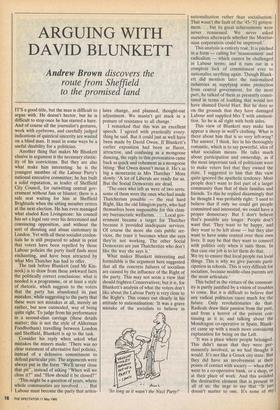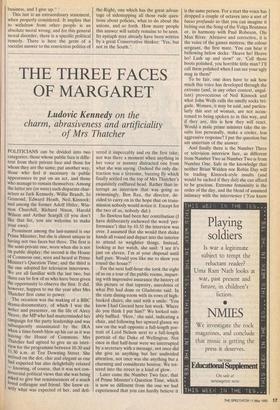ARGUING WITH DAVID BLUNKETT
Andrew Brown discovers the
route from Sheffield to the promised land
IT'S a good title, but the man is difficult to argue with. He doesn't hector, but he is difficult to stop once he has started a hare. And of course all the journalist's gestures, work with eyebrows, and carefully judged indications of quizzical sincerity are wasted on a blind man. It must in some ways be a useful disability for a politician.
Another thing that makes Mr Blunkett elusive in argument is the necessary elastic- ity of his convictions. But they are also what make him interesting: he is the youngest member of the Labour Party's national executive committee; he has built a solid reputation, as leader of Sheffield City Council, for outwitting central gov- ernment without fuss or bluster; there is a safe seat waiting for him at Sheffield Brightside when the sitting member retires at the next election. He has even managed what eluded Ken Livingstone: his council has set a legal rate over his determined and convincing opposition, and without the sort of shouting and abuse customary in London. Yet with all these socialist creden- tials he is still prepared to admit in print that voters have been repelled by those Labour policies the party itself finds most enchanting, and have been attracted by what Mrs Thatcher has had to offer.
The task before Blunkett (and Mr Kin- flock) is to draw from these awkward facts the politically correct conclusions: what is needed is a programme, or at least a style of rhetoric, which suggests to the voters that the party has abandoned its past mistakes, while suggesting to the party that these were not mistakes at all, merely an earlier, but now outmoded, way of being quite right. To judge from his performance in a second-class carriage (these details matter; this is not the style of Aldetman Foodbotham) travelling between London and Sheffield, Blunkett is up to the task.
Consider his reply when asked what mistakes the miners made: 'There was no clear statement of alternative fuel policies, instead of a defensive commitment to defend particular pits. The arguments were always put in the form "We'll never close that pit", instead of asking "When will we close it?" and "How should it be closed?"
'This might be a question of years, where whole communities are involved. . . . But Labour must become the party that articu- lates change, and planned, thought-out adjustment. We mustn't get stuck in a posture of resistance to all change.'
I remarked that this was an excellent speech. I agreed with practically every- thing he said. But it could just as well have been made by David Owen. If Blunkett's earlier exposition had been as fluent, attractive, and confusing as a mongoose dancing, the reply to this provocation came back as quick and vehement as a mongoose biting: 'But Owen doesn't mean it. He's as big a monetarist as Mrs Thatcher.' More slowly: 'A lot of Liberals are ready for us. But the Social Democrats are dead.
'The ones who left us were of two sorts: some of them were the ones who had made Thatcherism possible — the real hard Right, like the old Islington party, who had themselves been responsible for this clam- my bureaucratic welfarism. . . . Local gov- ernment became a target for Thatcher because it provided inadequate services. Of course the more she cuts public ser- vices, the truer it becomes when she says they're not working. The other Social Democrats are just Thatcherites who don't like the way she says it.'
What makes Blunkett interesting and formidable is the argument here suggested that all the concrete failures of socialism are caused by the influence of the Right of the party. This may not seem a view that should frighten Conservatives; but it is, for Blunkett's analysis of what the voters don't like about the Labour Party is very close to the Right's. This comes out clearly in his attitude to nationalisation: 'It was a grave mistake of the socialists to believe in
'So long as it wasn't the Nazi Party!'
nationalisation rather than socialisation. That wasn't the fault of the '45–'51 govern- ment. . . but its great achievements were never reassessed. We never asked ourselves afterwards whether the Morriso- nian corporation could be improved.'
This analysis is entirely true. It is pitched in a form — calling for 'reassessment' and radicalism — which cannot be challenged in Labour terms; and it runs out in a complete lack of commitment ever to nationalise anything again. Though Blunk- ett did mention later the nationalised industries as supplying some protection from central government, for the most part, he talked of them as presently consti- tuted in terms of loathing that would not have shamed David Hart. But he does so on the grounds that they have damaged Labour and supplied Mrs T with ammuni- tion. So he is all right with both sides.
This view of Blunkett may make him appear a sheep in wolfs clothing. What is there about him that is so very left-wing? The answer, I think, lies in his thoroughly romantic, which is to say powerful, idea of what socialism means. He talks much about participation and ownership, as if the most important task of politicians were to make voters feel that they owned the state. I suggested to him that this view quite ignored the apathetic tendency. Most people don't want to feel part of a larger community than that of their families and friends. To this he replied disarmingly that he thought I was probably right: 'I used to believe that if only we could get people committed and interested, we could have a proper democracy. But I don't believe that's possible any longer. People don't want that. They want to be happy, and they want to be left alone — but they also want to have some control over their own lives. It may be that they want to connect with politics only when it suits them. In that case our job is to let them do that. . . . We try to ensure that local people run local things. This is why we give parents parti- cipation in schools. This is very difficult for socialists, because middle-class parents are the most articulate.'
This belief in the virtues of the commun- ity is partly justified by a vision of troubles to come. But it is difficult to believe that any radical politician cares much for the future. Only revolutionaries do that. Radicals draw their passion from the past, and from a horror of the present con- tinuing as it is; and talking about the Mondragon co-operative in Spain, Blunk- ett came up with a much more convincing explanation for being on the Left. 'It was a place where people belonged. This didn't mean that they were per- manently involved, as we had thought it would. It's not like a Greek city state. But they did have an involvement at their points of contact with society — when they went to a co-operative bank, or a shop, or at their place of work. And this avoided the destructive element that is present in all of us; the urge to say that "It just doesn't matter to one. It's none of mY business, and I give up." ' This last is an extraordinary statement, when properly considered. It implies that to withdraw from other people is an absolute.moral wrong; and for this general moral disorder, there is a specific political remedy. There is here the germ of a socialist answer to the conviction politics of the .Right, one which has the great advan- tage of sidestepping all those rude ques- tions about policies, what to do about the unions, and so forth. How many people this answer will satisfy remains to be seen. Its epitaph may already have been written by a great Conservative thinker: 'Yes, but not in the South.'















































 Previous page
Previous page